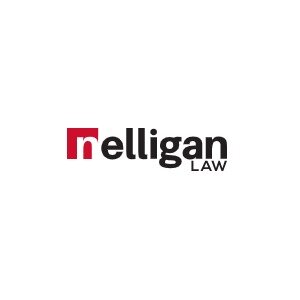Best Natural Resources Lawyers in Ottawa
Share your needs with us, get contacted by law firms.
Free. Takes 2 min.
List of the best lawyers in Ottawa, Canada
About Natural Resources Law in Ottawa, Canada
The field of natural resources law in Ottawa, Canada, encompasses a broad spectrum of legal areas focused on the management and use of natural resources such as water, minerals, forests, and energy resources. As the nation's capital, Ottawa serves as the hub for numerous federal governmental bodies that regulate environmental and natural resource policies. The city and its surrounding areas are rich in natural assets, making the regulation and sustainable management of these resources crucial. This legal area involves compliance with various environmental regulations, land use laws, conservation efforts, and the balancing of commercial interests with public and environmental health.
Why You May Need a Lawyer
Individuals and businesses might require a lawyer specializing in natural resources for various reasons. Common situations include negotiating land use agreements, resolving disputes over resource extraction rights, ensuring compliance with environmental regulations, securing permits for development projects, or litigating environmental damage claims. Specialists in this legal field can also aid in navigating complex government policies and any conflicts that may arise between private interests and public regulatory mandates. Whether you are dealing with mining operations, water rights, or energy projects, legal advice can be crucial for protecting your interests and ensuring regulatory compliance.
Local Laws Overview
Ottawa and the broader province of Ontario are governed by a mix of federal, provincial, and municipal regulations concerning natural resources. Key legislative frameworks include the Canadian Environmental Protection Act for federal-level environmental policies, the Ontario Resource Recovery and Circular Economy Act for recycling and waste management, and the Ontario Water Resources Act for water use and protection. At the municipal level, Ottawa has specific by-laws relating to land use planning and environmental protection. These laws collectively regulate how natural resources are managed and used, aiming to balance economic interests with environmental sustainability.
Frequently Asked Questions
1. What are natural resources, and why are they regulated?
Natural resources are materials or substances such as water, minerals, forests, and fossil fuels that occur in nature. They are regulated to ensure sustainable use, protect ecosystems, and balance economic interests with public health and environmental welfare.
2. Who is responsible for regulating natural resources in Ottawa?
Regulation of natural resources in Ottawa is overseen by federal and provincial governments, as well as municipal authorities. Each level of government has specific responsibilities and legislation that guides regulation.
3. What legal issues are common in natural resources law?
Common legal issues include disputes over land use rights, environmental compliance, resource extraction permits, and the negotiation of impact benefit agreements with Indigenous communities.
4. How do environmental laws impact natural resources projects?
Environmental laws require assessments and permits for projects to ensure minimal impact on ecosystems. They may require mitigation strategies and ongoing monitoring of project sites.
5. Can I extract resources from my own property?
Resource extraction rights depend on the type of resource and existing legislation. For some resources, additional permits or agreements may be necessary, even on private land.
6. What is an environmental assessment?
An environmental assessment is a process that evaluates the potential environmental impacts of a proposed project, helping decision-makers consider environmental values alongside economic and technical aspects.
7. What role do Indigenous peoples play in natural resources law?
Indigenous peoples have significant rights and interests in natural resource management, often requiring consultation and the creation of benefit agreements when projects affect their lands.
8. How are water rights regulated in Ottawa?
Water rights are regulated under provincial laws like the Ontario Water Resources Act, which governs water use, conservation, and quality standards. Permits may be required for significant water use.
9. What are impact benefit agreements?
Impact benefit agreements are negotiated between resource developers and Indigenous communities to provide economic benefits and address environmental impacts, ensuring shared interests in projects.
10. How can a lawyer assist with a natural resources project?
A lawyer can provide guidance on regulatory compliance, negotiate agreements, represent parties in disputes, and ensure that projects align with legal and environmental standards.
Additional Resources
For those seeking further information, consider visiting organizations like Natural Resources Canada and the Ontario Ministry of Natural Resources and Forestry. Environmental advocacy groups and local law societies can also provide guidance. The Environmental Commissioner of Ontario provides annual reports and insights into environmental policies and practices.
Next Steps
If you require legal assistance with natural resources issues, consider contacting a lawyer who specializes in environmental or natural resource law. Start by gathering any relevant documents and clearly articulating your issues or questions. Many law firms offer initial consultations to understand your needs and evaluate how they can assist. Preparing questions beforehand can help maximize the benefit of these meetings. If cost is a concern, inquire about payment plans or seek community legal clinics that offer services on a sliding scale basis.
Lawzana helps you find the best lawyers and law firms in Ottawa through a curated and pre-screened list of qualified legal professionals. Our platform offers rankings and detailed profiles of attorneys and law firms, allowing you to compare based on practice areas, including Natural Resources, experience, and client feedback.
Each profile includes a description of the firm's areas of practice, client reviews, team members and partners, year of establishment, spoken languages, office locations, contact information, social media presence, and any published articles or resources. Most firms on our platform speak English and are experienced in both local and international legal matters.
Get a quote from top-rated law firms in Ottawa, Canada — quickly, securely, and without unnecessary hassle.
Disclaimer:
The information provided on this page is for general informational purposes only and does not constitute legal advice. While we strive to ensure the accuracy and relevance of the content, legal information may change over time, and interpretations of the law can vary. You should always consult with a qualified legal professional for advice specific to your situation.
We disclaim all liability for actions taken or not taken based on the content of this page. If you believe any information is incorrect or outdated, please contact us, and we will review and update it where appropriate.









